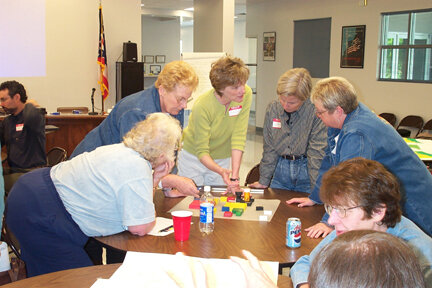
Public Participation in Environmental and Risk Decision Making
The Institute conducts research on public participation in environmental and risk assessment and decision-making at all stages of policy processes, including design, research, decision making, implementation, and evaluation. Our studies of public participation have touched on multiple policy arenas, including climate change adaptation, oil spill response, clean-up of contaminated sites, nuclear waste management, marine fisheries and aquaculture, forest management, watershed management, public health,.
Research in this area aims to improve understandings and develop processes that seek just, equitable, and integrative solutions by deliberating issues; clarifying interests and values; informing deliberations with high quality information; addressing issues of equity, power, and influence; discovering common understandings; identifying mutual responsibilities; and negotiating shared principles. It includes both development of theories of public participation and guidance for design of processes that are sensitive to the specifics of situational contexts.
Our research on public participation has both theoretical and empirical streams. We have conducted a series of research projects to investigate the ways that context matters in preferences for process features and the ways that preferences for process are linked to preferences for outcomes. A second stream of research relates to how different people define and make judgments about 'success' of public participation. A third stream involves the role of evaluation for improving process and for empowering interested and affected parties to be more effective participants.
Projects
Public involvement in public health and clean-up decision making at contaminated sites in the US nuclear weapons complex
Three evaluative tools to empower local communities in the environmental clean up of sediment contaminated sites
Evaluating public involvement processes by combining perspectives from planners, participants, and normative theory
The role of social networks in the formation of risk perceptions about low dose radiation risks
Publications
Webler, T. and Tuler, S. 2019. Four decades of public participation in risk decision making, Risk Analysis
Tuler, S., Dow, K., Webler, T., Whitehead, J. 2016. Learning through participatory modeling: Reflections on what it means and how it is measured. In: S. Grey and M. Paolisso, R. Jordan, S. Grey (eds.), Including Stakeholders in Environmental Modeling. Switzerland: Springer International Publishing.
Webler, T., Tuler, S., Dow, K., Whitehead, J., & Kettle, N. (2014). Design and evaluation of a local analytic-deliberative process for climate adaptation planning. Local Environment, 18:1-23.
Tuler, S. and Kasperson, R. 2013. Social distrust and its implications for risk communication: An example from high level radioactive waste management. In: Joe Arvai and Louis Rivers (Editors). Recent advances in risk communication theory and practice. (Washington: Earthscan).
Tuler, S. and Webler, T. 2006. Competing perspectives on a process for making remediation and stewardship decisions at the Rocky Flats Environmental Technology Site, Research in Social Problems and Public Policy 13: 49-77.
Webler, T. and Tuler, S. 2006. Four perspectives on public participation process in environmental assessment and decision making: Combined results from ten case studies, Policy Studies Journal 34(4):699-722.
Tuler, S. and Hersh, B. 2012. A Community Guide: Improving the links between future land-use and clean-up decisions. Report prepared for the Alliance for Nuclear Accountability, Santa Fe, NM. 87 pages.
